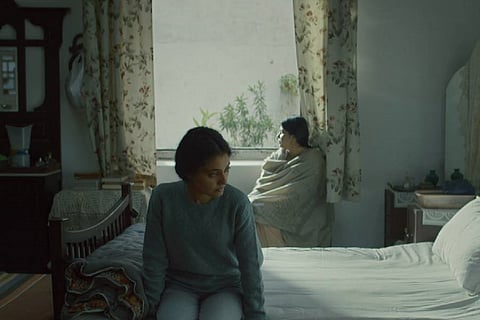

It is a little strange that one man, obsessed with running an old movie theatre in his city, should be so angered by his little daughter’s creation of a shoebox version of it. The girl, with a friend, expertly cuts out holes in the box, uses the laws of refraction she just picked up at school, sticks in toy chairs inside, and projects drawings onto a screen. For a science project, it looks admirably executed. The passion for cinema has seemingly passed onto the little girl from her father, who had spent so many of his waking hours in his theatre that his family barely got to see him.
This is only one aspect of Shoebox, featured in the 26th International Film Festival of Kerala (IFFK) in Thiruvananthapuram. Set in Allahabad, the film is placed in the backdrop of protests against a name change of the city, a tussle between the old and the new worlds, and the politics that play into all of it.
“The trigger for Shoebox came from my own observations of the city during the several years I spent there, while moving back and forth. After my formal education, I went to college in Maharashtra. Every time I came back to the city, I observed some sort of change. I saw my family too change with it. But while my family was growing older, the city was getting younger,” says Faraz Ali, the director of Shoebox.
Like Faraz, the protagonist of the film, Mampu, leaves the city for her higher education, coming back to it now and then, watching the changes. She seems torn between the two worlds, telling her uncle not to take his daughter away from home, for she too might feel like she belonged nowhere.
Mampu is upset to see her dad unwell, but still holding on to what is left of his old Palace Theatre long shut down. She watches politicians cajoling her dad to sell the old cinema, so the businessmen supporting them can build a shopping mall there. Mampu, outwardly not too sentimental about the theatre, slips into memories of her childhood, when she used to bunk school and sneak into the projection room with her friend Kaustabh. Her father (Purnendu Bhattacharya) always chided her for it, threatening her with an imaginary cane.
The exchanges between the dad and daughter are sweet to watch – the adult daughter now taking on the role of a parent, chiding the old man for his smoking habit. Amrita Bagchi is admirable as Mampu, a preoccupied young woman worried about her dad, as she slips into nostalgia in the company of her old friend Kaustabh (Ashutosh Sohan).
The cinema house naturally brings with it sweet memories of Cinema Paradiso, the Italian classic about an adorable friendship shared by a boy and a projectionist, who bond over their love for movies at an old fashioned theatre. “I really love the works of Giuseppe Tornatore (director of Cinema Paradiso). It is hard not to think of Cinema Paradiso when you are making a film of this genre. But it was not a conscious attempt. The focus was more on what cinema did in my city,” says Faraz.
But the projectionists he met during his journey to research on single screen theatres, across cities – Lucknow and Banaras and others – were not like Alberto – the projectionist in Cinema Paradiso, he says. They were not in love with cinema like him. They were more concerned about the poor wages they got.
In Shoebox, it is Mampu’s father Madhav, the owner of the theatre, who can’t seem to stop watching movies, religiously jotting down notes in carefully kept diaries. As an old man, he refuses to part with any of it, the moviehouse and everything it held, angering the men eyeing the land. “For them, it is just a piece of land, it doesn’t matter what is built there,” Madhav says, offended, as yet another price is offered for the place.
Politics is always in the air – in the form of election rallies, meetings of powerful men who made the calls, and as protests against the name change. Faraz says that his emphasis was on what politics itself did to the state over the past several years, not what any particular party did. “I wanted to address what politics and violence does to the fabric of a society. Everything is driven by someone’s agenda. When it came to naming the film, I was only thinking how these changes affected the lives of the protagonist, the projectionist, and others. Progress does not essentially mean you bury the past.”
When single screens transformed to multiplexes, they (businessmen) retained the balcony, Faraz says, for the expensive audience. But they didn’t think of the poorer audience. “Consciously or unconsciously, we have created a system of division.”
Faraz connects everything to cinema, his passion for it appearing as deep as that of Mampu’s father. What would have happened if a lockdown was imposed and there was no way to watch films, he wonders. Before turning to the world of cinema, Faraz was a student of literature. Shoebox is his first feature film.